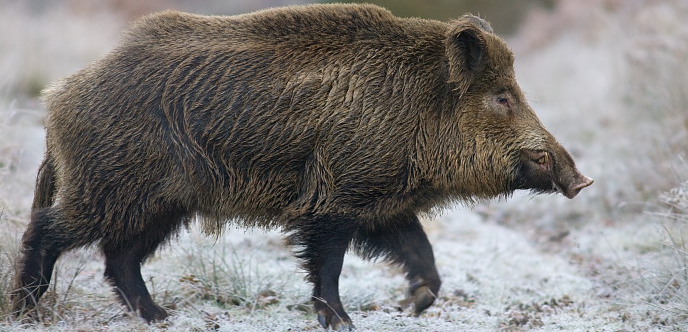Soaring populations of wild boar could pose a risk to human health, according to researchers.
Research by the Moredun Research Institute at Penicuik, near Edinburgh, concluded that the animals could be harbouring an antibiotic-resistant strain of methicillin-resistant staphylococcus aureus (MRSA) on their snouts, which the researchers warned could spread to humans as wild boar roam around the countryside.
However, the research was carried out on wild boar in Portugal, so its implications for wild populations in this country, notably the Forest of Dean, remain unclear. The researchers checked 45 wild boar in Portugal for signs of the bacterium Staphylococcus aureus and found the MRSA strain CC398 in one of them.
The study, published in the journal ‘Science Of The Total Environment’, said it was ‘a concern when MRSA is inhabiting the skin and nose of wild animals and is characterised with resistance to various antimicrobial agents in clinical use’.
“The convergence between habitats can lead to contact between wild animals and humans and this can increase risks of bacterial transfer and promote risks to human health,” it said.
Call for restrictions
Hugh Pennington, emeritus professor of bacteriology at Aberdeen University, has called for restrictions on the numbers of boar in woodlands.
“I’m not keen on introducing new animals,” he said. “They may be very nice to look at in the countryside, good for the tourist industry and hunting, but we have to look at what might happen should they be carrying organisms that we would rather not have.”
The National Pig Association (NPA) has long called for much greater efforts to curb out of control wild boar populations in the Forest of Dean in particular, where the March 2016 population estimate was 50% up on the 2015 figure.
However, the NPA’s concern is focused largely on the risk to local pig populations of serious and, in some cases, notifiable diseases potentially carried by wild boar. Wild boar have been implicated in the spread of African Swine Fever in Eastern Europe, for example.
Wild boar have also caused havoc among the general public, with reports around the Forest of Dean of animals wandering around town centres, wrecking bins and gardens and chasing dog walkers. Nearly 50 wild boar-related road traffic accidents were recorded in the area in less than a year.
MRSA risk
However, the MRSA risk is less clear in the UK, despite media reports, backed by the efforts of campaign groups to highlight the risk, suggesting it poses a risk to human health.
Humans can catch the strain from livestock and the bug is a major concern in parts of the EU, notably Denmark where it is widespread in pigs and has also been found in humans. It has been linked with the deaths of six people in Denmark.
Livestock-Associated MRSA CC398 has been found in the UK, including in packs of supermarket meat, but at much lower levels than in Denmark.
While humans can be affected the risk of spread between humans and animals is considered to be very low and, where infections do occur, they are generally mild. The Food Standards Agency (FSA) has looked into the risk of food-borne spread, describing it as ‘very low’.
“Based on current evidence, there are no reported cases of LA-MRSA being contracted through ingestion of contaminated foodstuffs, in the UK,” the FSA said.
“In conclusion the risk to human health from the preparation, handling and/or consumption of LA-MRSA/MRSA contaminated foodstuffs in the UK is very low, especially when compared to other routes of transmission.”




